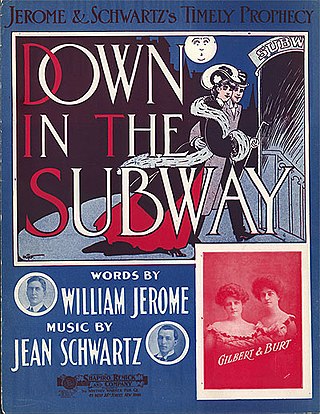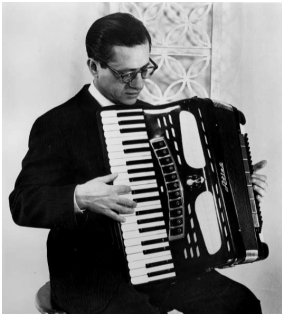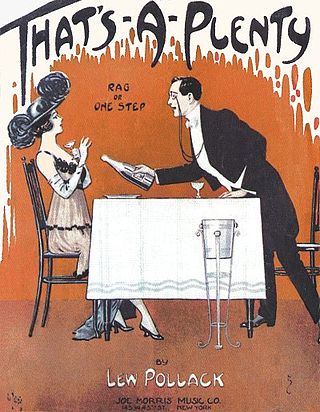RCA Records is an American record label owned by Sony Music Entertainment, a subsidiary of Sony Corporation of America.

Jean Schwartz was a Hungarian-born Jewish American composer and pianist. He is best known for his work writing the scores for more than 30 Broadway musicals, and for his creation of more than 1,000 popular songs with the lyricist William Jerome. Schwartz and Jerome also performed together on the vaudeville stage in the United States; sometimes in collaboration with Maude Nugent, Jerome's wife, and the Dolly Sisters. Schwartz was married to Jenny Dolly from 1913 to 1921.

William Jerome Flannery, September 30, 1865 – June 25, 1932) was an American songwriter, born in Cornwall-on-Hudson, New York, of Irish immigrant parents, Mary Donnellan and Patrick Flannery. He collaborated with numerous well-known composers and performers of the era but is best remembered for his decade-long association with Jean Schwartz with whom he created many popular songs and musical shows in the 1900s and early 1910s.

Benjamin Bernard Selvin was an American musician, bandleader, and record producer. He was known as the Dean of Recorded Music.

"Beer Barrel Polka", originally in Czech "Škoda lásky", also known as "The Barrel Polka", "Roll Out the Barrel", or "Rosamunde", is a 1927 polka composed by Czech musician Jaromír Vejvoda. Lyrics were added in 1934, subsequently gaining worldwide popularity during World War II as a drinking song.

"Singin' in the Rain" is a song with lyrics by Arthur Freed and music by Nacio Herb Brown. Doris Eaton Travis introduced the song on Broadway in The Hollywood Music Box Revue in 1929. It was then widely popularized by Cliff Edwards and the Brox Sisters in The Hollywood Revue of 1929. Many contemporary artists had hit records with "Singin' in the Rain" since its release, including Cliff Edwards, Earl Burtnett and Gus Arnheim in 1929 alone.

"Shine On, Harvest Moon" is a popular early-1900s song credited to the married vaudeville team Nora Bayes and Jack Norworth. It was one of a series of moon-related Tin Pan Alley songs of the era. The song was debuted by Bayes and Norworth in the Ziegfeld Follies of 1908 to great acclaim. It became a pop standard, and continues to be performed and recorded in the 21st century.

John Serry Sr. was an American concert accordionist, arranger, composer, organist, and educator. He performed on the CBS Radio and Television networks and contributed to Voice of America's cultural diplomacy initiatives during the Golden Age of Radio. He also concertized on the accordion as a member of several orchestras and jazz ensembles for nearly forty years between the 1930s and 1960s.

Alexander Emil Caiola was an American guitarist, composer and arranger, who spanned a variety of music genres including jazz, country, rock, and pop. He recorded over fifty albums and worked with some of the biggest names in music during the 20th century, including Elvis Presley, Ray Conniff, Ferrante & Teicher, Frank Sinatra, Percy Faith, Buddy Holly, Mitch Miller, and Tony Bennett.

RCA Thesaurus, a brand owned by RCA Victor, was a supplier of electrical transcriptions. It enjoyed a long history of producing electrical transcriptions of music for radio broadcasting which dated back to NBC's Radio Recording Division.

"My Melancholy Baby" is a popular song published in 1912 and first sung publicly by William Frawley. The music was written by Ernie Burnett (1884–1959), the lyrics by George A. Norton.

"Chicago" is a popular song written by Fred Fisher and published in 1922. The original sheet music variously spelled the title "Todd'ling" or "Toddling." The song has been recorded by many artists, but the best-known versions are by Frank Sinatra, Ben Selvin and Judy Garland. The song alludes to the city's colorful past, feigning "... the surprise of my life / I saw a man dancing with his own wife", mentioning evangelist Billy Sunday as having not been able to "shut down" the city, and State Street where "they do things they don't do on Broadway".

American Rhapsody was written for the accordion by John Serry Sr. in 1955 and subsequently transcribed for the free-bass accordion in 1963 and for the piano in 2002. The composer was inspired by the classical orchestral works of George Gershwin along with various Latin jazz percussive rhythms utilized throughout South America while composing this opus.

"Nobody's Sweetheart", also known as "Nobody's Sweetheart Now" and "You're Nobody's Sweetheart Now", is a popular song, written in 1924, with music by Billy Meyers and Elmer Schoebel, and lyrics by Gus Kahn and Ernie Erdman. The song is a jazz and pop standard.

"Oh, You Beautiful Doll" is a ragtime love song published in 1911 with words by Seymour Brown and music by Nat D. Ayer. The song was one of the first with a twelve-bar opening.

"Somebody Stole My Gal" is a popular song from 1918, written by Leo Wood. In 1924, Ted Weems & his Orchestra had a five-week run at number one with his million-selling version. Its Pee Wee Hunt and his orchestra version is also known in Japan, particularly in Osaka and surrounding area as the theme song used by Yoshimoto Kogyo for their theatre comedies at Namba Grand Kagetsu and other venues.
"If You Knew Susie" is the title of a popular song written by Buddy DeSylva and Joseph Meyer. It was published by Shapiro, Bernstein & Co. in 1925. The sheet music included ukulele tabs by Richard Konter. In the largely comic song, a man sings that he knows a certain woman named Susie to be much wilder and more passionate than most people realize.

"That's a Plenty" is a 1914 ragtime piano composition by Lew Pollack. Lyrics by Ray Gilbert were added decades later. Several popular vocal versions have been recorded, but it is more often performed as an instrumental.
"La Cinquantaine" is a piece of music which was composed by Jean Gabriel-Marie in 1887.
















